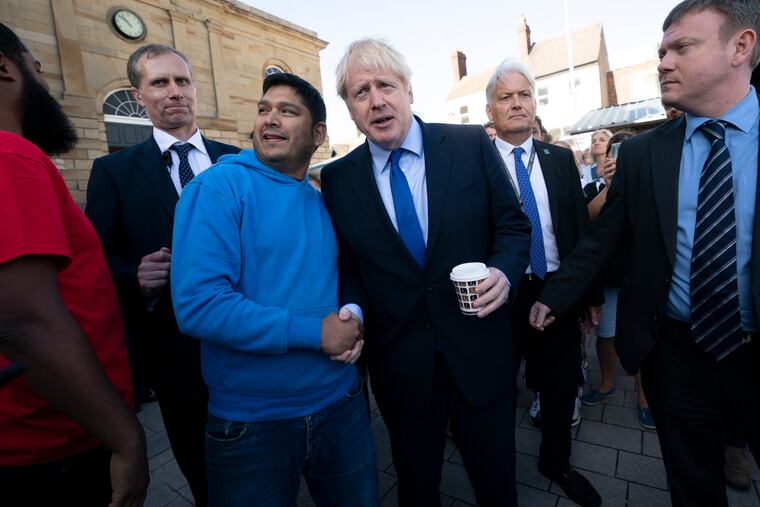Boris Johnson, Jean-Claude Juncker to meet in Brexit breakthrough bid
British Prime Minister Boris Johnson and European Commission President Jean-Claude Juncker will hold face-to-face talks next week in a bid to break the Brexit impasse.

LONDON — British Prime Minister Boris Johnson and European Commission President Jean-Claude Juncker will hold face-to-face talks next week in a bid to break the Brexit impasse.
European and British officials say the meeting will take place Monday in Luxembourg. No further details were provided. It comes as lower-level Brexit negotiations have produced few signs of progress as the Oct. 31 deadline for Britain's departure from the European Union nears.
» READ MORE: Boris Johnson denies lying to Queen Elizabeth II; court rejects Brexit case
The key stumbling block remains the so-called Irish backstop, a maneuver to prevent both sides from putting in a hard border between Ireland, which is in the EU, and Northern Ireland, which is part of the United Kingdom. British officials fear the backstop could keep Britain tied to EU rules and regulations even after it withdraws from the bloc.
With concerns about the social and economic costs of a "no-deal" Brexit rising, Britain's Parliament has passed a law saying the prime minister must seek an extension to the Brexit deadline if no deal is reached by mid-October. Johnson has indicated he will not do so, insisting Britain will leave the EU on Oct. 31 even without a divorce deal.
John Bercow, the retiring speaker of Britain's lower house of parliament, says Parliament is willing to take forceful actions to make sure the law designed to block a "no-deal" Brexit is followed. The influential speaker says he will allow "procedural creativity" in making sure Johnson does not violate the new law, which took effect this week.
Johnson has declared he would rather be "dead in a ditch" than delay Brexit again. Britain voted to leave the EU in a 2016 referendum but has not reached consensus on how to do so.
» READ MORE: Boris Johnson’s suspension of U.K. Parliament ruled unlawful
Bercow said in a speech Thursday night that the prime minister must obey the law and that it is "astonishing" that any other course is being contemplated.
"It would be the most terrible example to set to the rest of society," he said.
Bercow plans to step down by the end of October but it is clear he will use his final weeks to make sure Parliament's will is respected on the crucial question of a possible "no-deal" departure from the EU bloc.
The British government's own assessment suggests an abrupt departure from the EU's single market without an agreement risks severe economic problems and possible food and medicine shortages in Britain.
Parliament is currently suspended, or prorogued, for five weeks. Johnson's decision to suspend the legislative branch for such an extended period, however, has been ruled unlawful by a Scottish court and will be taken up by the U.K. Supreme Court on Tuesday.
Court documents released Thursday night show that Court of Session judges did not believe Johnson's decision to suspend Parliament was routine, as the prime minister claimed, but was actually made for the "unlawful" purpose of avoiding scrutiny during the run-up to Brexit.
"The effect of the prorogation under consideration, in particular its length, is that proper parliamentary scrutiny is rendered all but impossible," wrote James Drummond Young, part of the three-judge panel that concluded Johnson's decision was illegal.
The Scottish court did not order Parliament to be recalled, but an adverse decision for Johnson at Britain's Supreme Court would likely bring its feisty lawmakers back into session earlier than he had intended.
It would also raise questions about whether Johnson’s government misled Queen Elizabeth II when it requested her approval for the five-week suspension of parliament, which she gave.